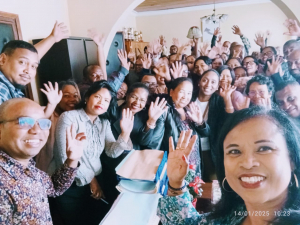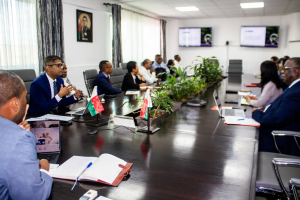Madagascar Customs adopts competency-based human resource management system
23 June 2025
By Ms. Volasoa RAZAFITRIMO, Director, Human Resources Directorate, Madagascar CustomsOver the past decade, Malagasy Customs has set in motion a series of reforms. In total, 31 projects have been initiated with a view to streamlining processes, updating legislation, digitalizing operational and administrative procedures, and enhancing infrastructures and work tools.
To give momentum to these reforms, a strategic and sustained investment had to be made in human capital, which is recognized as an essential component in the success of any reform measure. With this in mind, skills development, team mentoring, performance management, capacity building and career management have become major priorities.
Malagasy Customs’ Human Resources and Training Directorate therefore had to play a central role in the overall modernization process, in particular in order to enhance staff capacity to adapt. Despite the resistance occasionally encountered in this regard and the significant demands on time and patience, the measures implemented in these areas have borne fruit.
Early stages
Malagasy Customs’ Human Resources and Training Directorate comprises four departments: Human Resources, Training, Performance and Quality Management, and Equipment.
It had not previously been involved in the process of identifying officers’ training and skills development requirements, as this process fell within the remit of the various operational entities which simply used to forward details of their requirements to the Training Department. Consequently, the offer of training courses was not aligned with Malagasy Customs’ strategic objectives.
The modernization work undertaken with organizations that promote capacity building, such as the World Bank or the WCO, had highlighted various shortcomings and failures in relation to human resources. Moreover, a programme of reform focusing on the application of various tools developed by those partner organizations had been initiated in 2015.
Then, in 2020, the Directorate General of Customs decided to continue those efforts by adopting a “project-based approach” that would be aligned with the WCO Strategic Plan and its recommendation to implement a competency-based human resource management (HRM) system.
Following analysis of the situation thus far, two priority activities were identified:
- jobs mapping and job descriptions: this activity was aligned with the new government GPEEC policy (forecast management of staff, jobs and skills) which aims to ensure consistency between officers’ skills and the requirements of the relevant administration;
- assessment of officers with a view to gathering basic information on each employee’s skills.
A multidisciplinary team
Once the broad outline of the project’s activities had been determined, a project team needed to be created. A director and project leader were also appointed, following a call for applications to head up the project team.
The team was made up of HRM Directorate representatives as well as interdisciplinary officers working in support and operational roles, thus representing every directorate, department and office in order to adopt a more participatory approach. This diversity has been one of the main factors in the project’s success.
The team relied on the WCO’s HR-related tools, in particular the Guide to Implementing Competency-Based Human Resource Management in a Customs Administration Environment. On that basis, it could gain a better insight into the most effective methodology to be adopted.

Partnership with the Accelerate Trade Facilitation Programme
Although WCO tools can be used autonomously by any team responsible for modernizing human resources, WCO Members may benefit from the mentoring provided by experts from the Secretariat, thus helping them to develop their HR skills.
From 2021 onwards, Malagasy Customs could benefit from this kind of support under the Accelerate Trade Facilitation Programme, funded by the UK’s His Majesty’s Revenue and Customs (HMRC), which aims to help developing countries build their Customs capacity in order to implement the WTO Trade Facilitation Agreement (TFA) effectively. In addition to HR management, the multiyear partnership between Malagasy Customs and the Programme covers support for the AEO programme, risk management and expedited shipments.
The teams from Malagasy Customs and the WCO started working remotely in 2022 before coming together at a number of in-person meetings between 2022 and 2023.
Overall, a document comprising over 600 pages was drawn up by the project team and sent to the WCO for comments. Following delays caused by staff changes in the WCO Secretariat, the WCO’s experts had to link the work carried out by the project team to the situation prevailing in Madagascar and to the country’s socio-political constraints. Once their comments and information had been relayed, some aspects of the document needed to be reworked. Nevertheless, after this work was completed, the two parties were able to step up the pace and proceed to finalizing the document. It is important to note that this work affected the implementation of a number of projects, because the recruitment processes were suspended. For instance, the development of one AEO programme was delayed because the personnel initially recruited did not have the required skills.

Tools developed
In March 2025, the team responsible for the Accelerate Trade Facilitation Programme examined and approved the skills-related HRM tools developed by Malagasy Customs.
These tools include:
- a jobs catalogue comprising four professional groupings, 18 types of jobs and 144 positions;
- a competency framework incorporating 174 technical and cross-disciplinary skills;
- a skills dictionary for guaranteeing a common terminology; and
- skills-focused job descriptions.
Unfortunately, measures to introduce staff appraisals have not come to fruition on account of resistance from the staff union.
The WCO’s experts have also supported the drafting of a change management plan for the effective implementation of the validated tools. The management plan made provision for a series of activities split into three phases:
- a pre-deployment phase: focused on boosting the skills of the project team, institutional communication for Customs officers, and improving and updating tools;
- an on-site deployment pilot phase: for identifying, informing and preparing those staff involved in the pilot project tests; and
- a phase for examining results and incorporating them into HR practices: concerned with the analysis and processing of results from the assessment of skills gaps, the results being used for recruitment, human resources development and performance management purposes.
One of the impact indicators within the partnership with the WCO’s Accelerate Trade Facilitation Programme was that Malagasy Customs has an increased capacity “to manage inclusive and transparent Customs operations and trade facilitation reforms in an effective manner”. This objective has now been achieved.
Factors for achieving success
Any reform relies on the commitment of the management team and on the determination of the project managers.
The Director General took part in the WCO’s virtual conference and personally spoke in defence of the reform project. Bearing in mind that a new organization chart had been submitted to the government prior to the reform, it had become necessary to ensure that the jobs catalogue and the job descriptions were consistent with the new – rather than the old – organization chart, in anticipation of its future approval.
The project’s implementation is a testament to the perseverance shown by the project team in spite of the challenges faced. Among their many challenges, the team had to manage the delays created as a result of efforts to fill the position of human resources director following the death of the previous incumbent.
Whilst inheriting this vast and complex reform project, the new Director of Human Resources was also responsible for Malagasy Customs’ bicentenary celebrations, bringing together Customs directors from around the world. She has worked tirelessly in preparing for and organizing the visits by WCO experts.
Good communication with officers regarding the purpose, objectives and importance of the project is also critical. Communication was initially established in-house by the Director of Human Resources and Training during a video-conference. After that, it was officially given over to the Director General who used the occasion before the general public and Customs staff to introduce the HRM tools and officially launch the next stage of the project.
Upcoming developments
One project is under way to provide the HR Directorate with a digital human resources information system using the platform known as IKOLO, which means “Informatika Kolo OLOmbelona” or “software taking care of the human factor”.
Developed in partnership with Korea Customs, IKOLO facilitates integrated, dematerialized and secure management of the entire HR cycle: placements and mobility, recruitment and job profiles, tailored training, performance monitoring, career management and career paths.
In focusing its human resources around skills and in adopting modern tools, Customs is seeking to become more flexible, inclusive and effective. This transformation is a critical milestone in addressing the challenges of international trade and in supporting Madagascar’s economic development.

